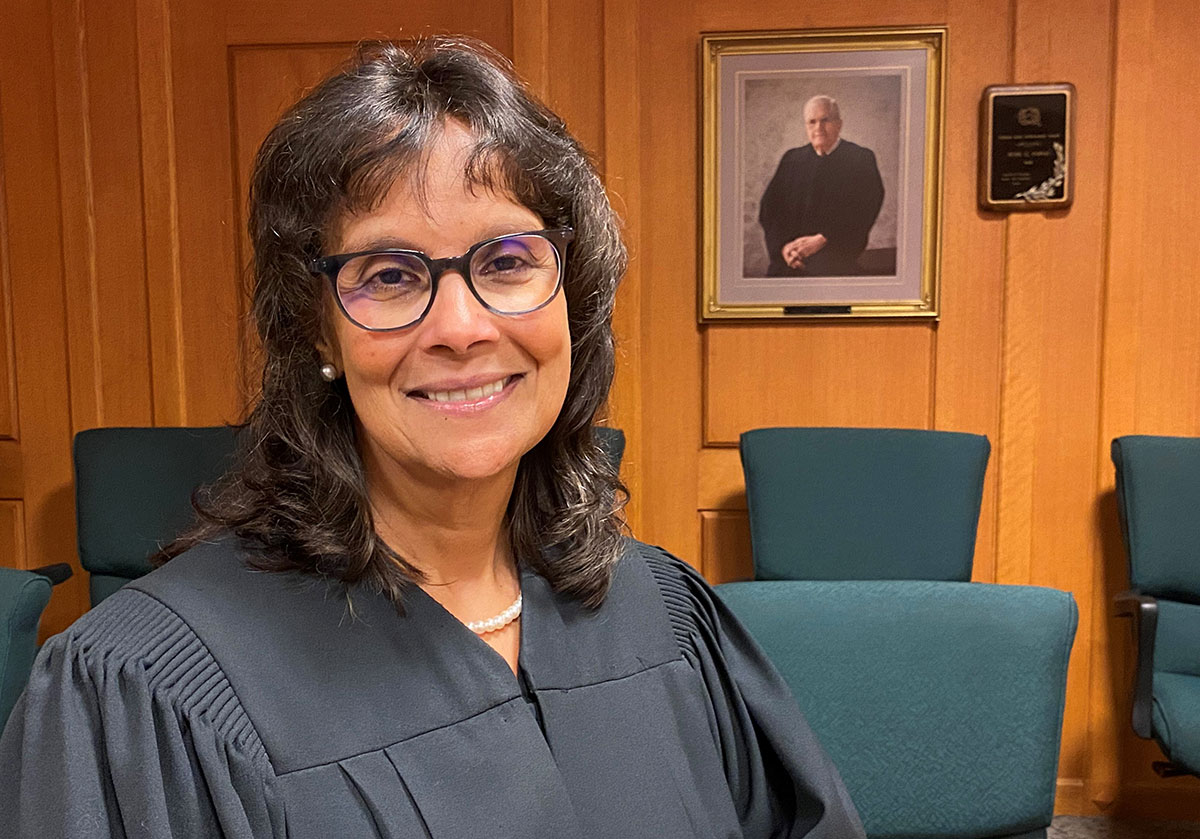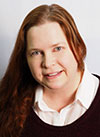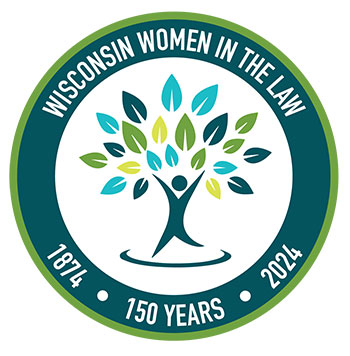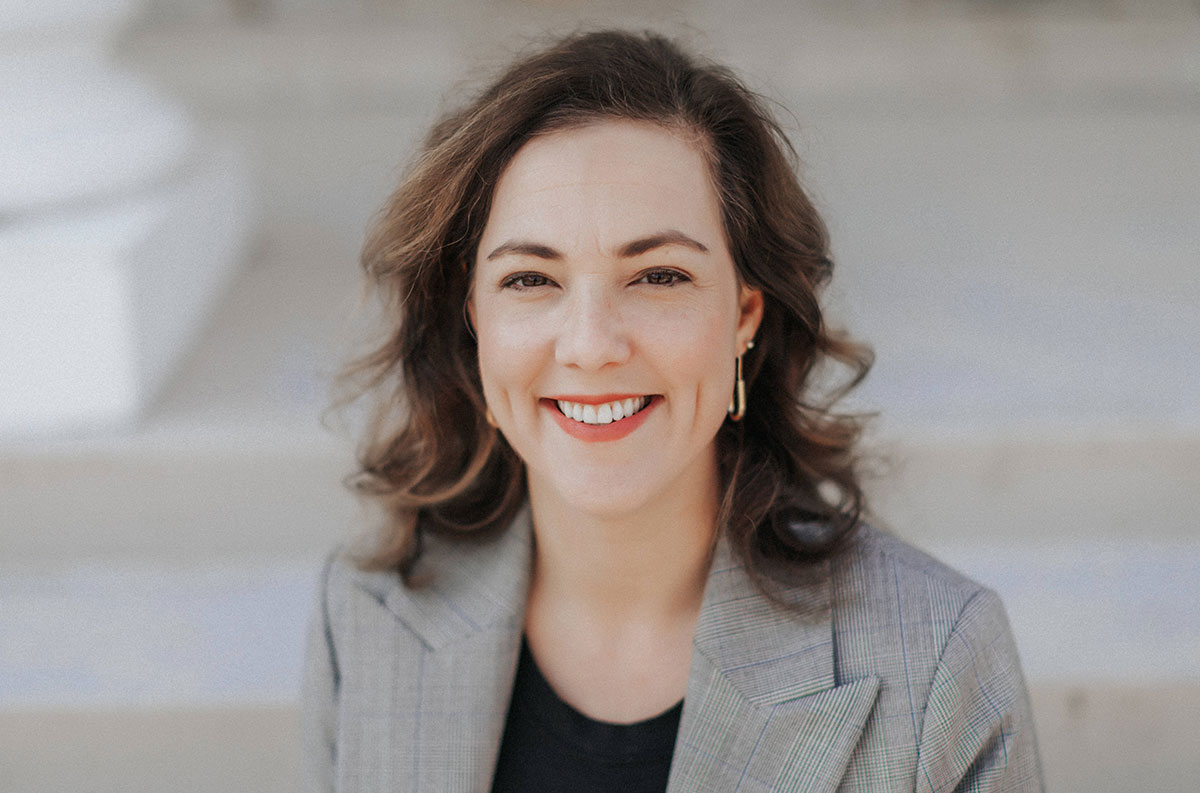
La Crosse County Circuit Court Judge Ramona Gonzalez received the State Bar of Wisconsin’s Lifetime Jurist Award in 2023. Over her shoulder in her courtroom is a portrait of Judge Peter Pappas, a mentor and her Branch 1 predecessor, who received the Lifetime Jurist Award in 1998.
Judge Ramona Gonzalez became the first woman and the first person of color on the bench in La Crosse County when she was elected in April 1995.
That no one who looked like her had ever been on that bench didn’t motivate or deter her from running – rather, it was something else from her background.
Gonzalez lived with her family in the Dominican Republic until she was 5 years old. The choice for her family, she said, was “leave or die.” The experience was a lesson that stuck with her: democracy is fragile and needs constant tending.
Once in the U.S., her father became a physician, as did many of her close relatives. Gonzalez learned to speak English by watching American television and enjoyed watching Perry Mason. From her earliest memory, she wanted to be a lawyer.
She received her bachelor’s degree in political science from Loyola University in Chicago and her law degree from Marquette University Law School. “I’ve always been focused on a public responsibility – to vote, to serve, to maintain what we have here in the U.S. Many people here take that for granted.”
In 1981, as a new lawyer, she interned with two judges, both important mentors for her: Judge Peter G. Pappas and Judge Dennis Montabon. By 1995, in her 15th year of practice in La Crosse, Gonzalez responded to Judge Pappas’s retirement by wondering who would replace him.
That it might be an uncontested race bothered her. “I’m from a place where people died so they could vote and have a choice. And here was an election to replace a long-standing jurist, and yet there would be no competition,” she said.
Gonzalez learned from her father, who emphasized education. “Never take a back seat because of your gender: There is more women can do in addition to getting married and raising children – there’s service to accomplish in your community,” her father told her.
So, she ran for the seat. “I ran because I thought I had something to give, and because I believed I could do the best job,” she said. In running for judge in 1995, she knew that she would represent two firsts. “I did not see that as an obstacle that I could not overcome,” she said.
Other Contributions to the Profession and the Public
Gonzalez has been active with the National Council of Juvenile and Family Court Judges (NCJFCJ), the oldest judicial membership organization in the U.S, which provides training and knowledge for judges involved in family, juvenile, and domestic violence cases. She was the first president of the NCJFCJ born outside the U.S. During her time as president, in 2019, Judge Gonzalez testified before the House Judiciary Subcommittee on Crime, Terrorism, and Homeland Security on the reauthorization of the Violence Against Women Act.
 Shannon Green is communications writer for the State Bar of Wisconsin, Madison. She can be reached by email or by phone at (608) 250-6135.
Shannon Green is communications writer for the State Bar of Wisconsin, Madison. She can be reached by email or by phone at (608) 250-6135.
Gonzalez is a leading expert on family law issues, particularly national and international matters relating to child abduction, unaccompanied minors and immigration, LGBTQ+ youth, and domestic violence. She has participated in conventions, conferences, seminars, and workgroups throughout the world as a representative of the U.S. judiciary and regularly addresses national and international audiences as a trainer and keynote speaker.
Gonzalez served on the Wisconsin Anti-Human Trafficking Task Force and is a member of the Wisconsin Judicial Committee on Child Welfare and the Wisconsin Department of Children and Families’ Youth Justice Council. On a national level, she is also a member of the Gault Center (formerly the National Juvenile Defender Center) Judicial Council, the Association of Family and Conciliation Courts, the American Judges Association, and the National American Indian Court Judges Association.
Since Gonzalez first took the bench, the justice system’s response to domestic abuse cases has improved greatly. “We are more culturally aware,” she said. Yet more awareness is needed. “It’s hard for people to see the nuances of these cases. There’s been improvement – but there’s a way to go yet.”
Forging Connections in the Courtroom
Judge Gonzalez was reelected in 2001, 2007, 2013, and 2019. She plans to retire at the end of her fifth term, on July 31, 2025 – making it 30 years on the bench.
Gonzalez came to the bench as an outsider – breaking the mold, she says, of who is considered the type of person to be a jurist. “I think we’ve changed some hearts and minds over those three decades that judges don’t have to all come from a place of stereotype of white-haired men, that judges can be men and women not just coming from the district attorney’s office, but also from the Public Defender’s Office and private practice. My community is open to that, and that makes me proud.”
What gives Gonzalez the most joy, looking back, are the connections she’s made with the people who come to her courtroom. In many cases over the years, she has been the person in the courtroom who has known the defendant the longest. “There’s a connection made when I can take someone through that trajectory of their life, that brought them to this moment, and change it for the better,” she said. “I believe that I am where the universe says I’m supposed to be.”
So, “day in, day out, doing the job I do, connecting with people over the years – this is the highlight of my career,” she said.
Making History: Celebrating 150 Years of Women in the Law

Lavinia Goodell’s epic battle to open the practice of law to women paved the way to a more inclusive profession and greater access to justice for underserved individuals and communities.
Join Wisconsin’s legal community this year in celebrating the significant contributions of women in the law.
June 17: Commemoration of Lavinia Goodell’s Admission to the Bar, 5 p.m., Rock County Courthouse, reception to follow. In April, Gov. Tony Evers signed a proclamation naming June 17, 2024, as Wisconsin Women Lawyers Day in honor of Lavinia Goodell. The proclamation recognizes the lasting impact of women lawyers on the fabric of the state’s legal system and emphasizes the importance of continuing to support and promote the advancement of women in the legal profession.
June 21: Five Important Legal Developments Affecting Women and the Women Lawyers Who Advanced Them, 3:15 p.m., State Bar Annual Meeting & Conference, Green Bay.
August 8: Old World Wisconsin court battle between Lavinia Goodell and Chief Justice Edward Ryan, 11 a.m. and 1:30 p.m., Old World Wisconsin, Eagle.
Questions? Contact Mary E. Burke at WisWomenLaw150@gmail.com.
Advice to New Lawyers
Gonzalez has advice for new lawyers: Be true to yourself. There is much about a law career that can be overwhelming, she said. “Don’t fake it until you make it. You have to trust yourself.”
She cautions against falling into stereotypes of what a lawyer must be; lawyers shouldn’t think they can be cutthroat in the courtroom and be themselves at home in the off hours. “You have to make peace with who you are. You have to live with what you do in your day-to-day life during your career. It is burdensome to carry experiences with you that you’re not proud of.”
The Challenges Women Still Face
“We are still swimming through the cultural consequences of generations of women not being valued as equal partners with men,” Gonzalez said.
“Women are still judged by a different standard. I keep hoping as time goes on that we begin to have less of that, but you just have to look around – to what’s happening with reproductive care – to see that we still haven’t reached that promised land of equality.”
Gonzalez said the world we’ve created is one in which many people think in terms of winners or losers and think that for women to have more means men have less. “I don’t believe that. I believe that if we start thinking of everyone as equals, we are all going to get better,” she said. “Unfortunately, that’s not what many believe.”
But this is why Gonzalez is very proud of her community in La Crosse County. “Electing me so many years ago, they could see that position as being filled by someone different from all those who were before me.”
Women to Watch | Kate Drury: On Finding a Passion in Criminal Defense
Kate Drury’s early advocacy work fuels her interest in criminal defense and the immigration law consequences for her clients. This problem solver and leader finds her niche as the Immigration Practice Group coordinator for the State Public Defender’s (SPD) Office. A move back to the courtroom reflects her passion for trial practice. “There’s nothing like it,” Drury says.

By Joyce Hastings
What shaped your decision to become a lawyer?
I am a problem solver by nature. I went to law school because I was interested in the push-pull dynamics of migration, and I believed a law degree would empower me to make real change. As a college student, I participated in an immersion program in Chile. I hoped that law would enable me to work with others to make a difference.
As a public defender, which career accomplishments make you most proud?
I’m most proud of all I’ve done to live up to the aim of zealous advocacy for my clients. It is my job to represent indigent clients, often non-native English speakers, to the best of my ability. My accomplishments are often reflected in the efforts most people don’t see – the time spent with clients making sure they are heard and their stories are told and the effort I pour into their cases.
Being a public defender is not something you do for money or prestige. It’s something you do because you believe justice is important.
What led you to coordinate the SPD’s Immigration Practice Group?
A variety of experiences fueled my interest in this area. Before attending law school, I volunteered as an ESL (English as a second language) teacher in the Milwaukee County jail. I also volunteered in VAWA (Violence Against Women Act) and U-visa clinics and as a paralegal at the Central American Resource Center in Los Angeles.
While attending the U.W. Law School, I realized I wanted to pursue my passion for immigration work through a criminal defense practice. As a volunteer, I screened immigration detainees for potential relief in partnership with the National Immigrant Justice Center and worked in the law school’s Legal Assistance to Institutionalized Persons (now Legal Assistance to Incarcerated People) program and the Public Defender Project.
I started my career with the SPD after graduating in 2011, then worked in private practice in criminal defense before returning to the SPD. I also served on the board of the Community Immigration Law Center in Madison.
You worked as regional attorney manager for five SPD offices covering 13 counties. What did you learn about being a good mentor?
Being a good mentor means leading by example. It means being authentic and resilient. We are most effective when we don’t try to copy someone else’s style.
The best advice I received as a young lawyer was to be myself in court and in front of juries. I offered the same advice as a manager.
Resilience is one of the most important skills in my line of work. You need dedication, a tremendous work ethic, and grit. During the COVID-19 pandemic, I oversaw about 70 employees, which posed significant extra challenges for my team. They needed to see that I was resilient and determined to help us all succeed.
Why did you return to a trial practice in the SPD’s Stevens Point office?
In the end, I love being a trial lawyer. I wanted to devote more time to directly representing clients in the courtroom. There is nothing like it.
I very much appreciate the opportunity to serve in SPD management. We faced significant challenges – finding private bar attorneys to represent clients in central Wisconsin and the Northwoods area, communicating with clients, and managing court appearances during the pandemic, as examples. We worked hard to handle these challenges as best we could.
What concerns you about the current state of immigration law and its impact on criminal defendants?
My greatest concern is a combination of the state criminal justice system’s limited understanding of immigration law and the absence of universal representation in federal immigration removal court.
I represent clients charged in state criminal cases, and immigration law is a complex and unique area of federal law. In an already overburdened criminal justice system, it is challenging for others to really understand the life-altering immigration law consequences for my clients. Wisconsin law currently treats immigration ramifications as collateral consequences of criminal convictions, and there is no right to counsel in federal immigration removal court.
A mother being deported and separated from her children implicates just as much, if not more, of the liberty interests that ensure a right to counsel in a criminal case. If a lawyer is not a luxury for her in criminal court, the same rationale should apply in removal court.
What are the greatest opportunities for women to make an impact in the law?
Women have the greatest impact by pursuing practices they are passionate about. I encourage young lawyers to think about how to better help their communities and how to use their legal advocacy skills to fill those unmet needs. As women, we likely know how it feels to be prejudged or misunderstood. That understanding can make us better lawyers.
I also encourage new lawyers to become active in their local legal communities. The connections I make help me thrive professionally and open doors to new ways to help my clients.
What is your hope for the future of women in the profession?
I hope to see woman do what they have always done – being zealous advocates, listening to our clients, supporting our colleagues, and doing our part to improve the system around us. Let’s keep up the amazing work.
Joyce Hastings and Mary E. Burke are coordinating this series of woman history makers and women to watch in celebration of the 150th anniversary of women in the law in 2024.
» Cite this article: 97 Wis. Law. 39-42 (May 2024).
